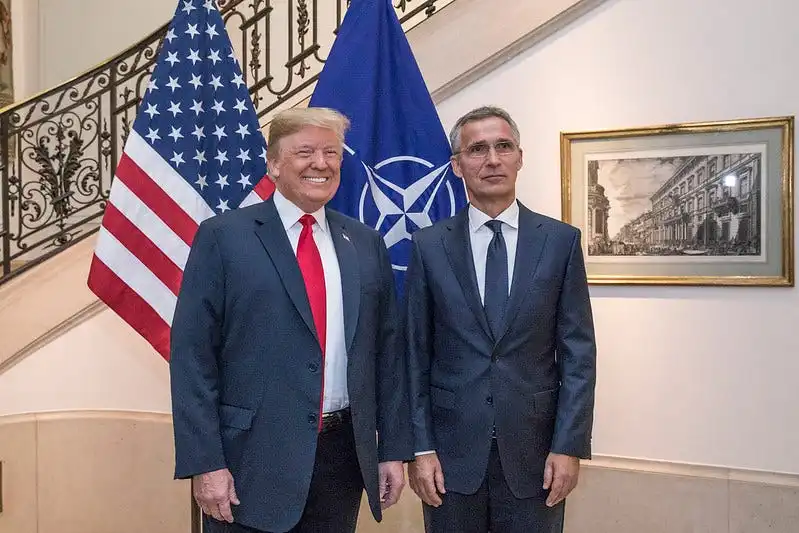I found this on Reddit and I read the whole thing, I thought it was interesting.
The author argues in favour of greater European independence on defence (and less dependence on the US). The article is a year old but I think it’s still relevant.
The author is apparently a journalist with France 24, a French state-owned media company, so you could say that makes him biased in favour of the French position. But I think he still makes valid points.
I don’t think any reasonable person can argue in good faith that Europe should rely on the US and Turkey in order to defend itself.
The EU is a bit of a mess, but I think it is a decent starting point for a defence union. The very reason it’s so hard to make it happen - constant vetos by random countries who are reluctant to accept the majority opinion - is also what would make it good. Abusing power (by for example attacking) would be difficult, but there is a strong common interest in defending the borders of Schengen.
Yeah maybe the veto thing is a bit silly. Maybe these matters could be decided by a majority vote in the EU parliament.
Qualified majority on foreign policy matters by the Council and a simple majority from the parliament. Also the option to defend the EU called out by the Commission to be able to act quickly.
I think the veto thing is absolutely necessary. The most important functions (defence when attacked, disaster relief) should be triggered automatically without political involvement should they ever become relevant; anything extra beyond core functions should be high hanging. If not we’ll have a European desert storm before we know it.
I have come to think that the only thing that is going to save Europe is how much we struggle to agree on anything. That’s a good thing in times when majorities are untrustworthy.
Majorities might produce bad decisions sometimes but the alternative is that you have leaders making decisions that the majority of people don’t like… which is arguably worse.
As for the veto, I wonder if the EU will dislike that sort of thing in the future, especially if greater EU co-operation is seen as necessary in order to compete with (and defend from) large powers like the US and China. If one country vetoes something that the majority of Europeans want, is that good? Maybe not.
Yeah, for sure it depends on the situation. But for military cooperation I think it might be good not to be too trigger happy.
No doubt for other things we need to be able to decide things without Hungary.
for military cooperation I think it might be good not to be too trigger happy
True. I guess maybe for some actions, a two-thirds majority of votes could be required. I dunno.
The veto thing is the only way the individual countries can maintain their sovereignty. It’s a union, not federation. There should definitely be mutual cooperation on defence, immigration etc but nobody will agree to cooperation if they are obliged to follow other countries plan. Ireland, for instance is constitutionally neutral. Small countries won’t want to be bullied by larger, so France and Germany combine almost could control everything with simple majorities. Larger countries want the smaller countries to contribute their fair share and not be carried.
There isn’t a binary «veto»/«simple majority». Supermajorities exist, and the Council already has rules like double-majorities to preserver a smaller country’s voice. Vetoes only work for small groups, and cause gridlock in all other cases.
Ireland, for instance is constitutionally neutral
That’s why article 42 is worded that way. Ireland (and Austria) not being able to contribute directly doesn’t mean that the 25 other countries can’t act.
I get that, which is why my response pointed out that it’s not as simple as a majority of a veto, but that France/Germany combined has a large population bloc that means without them, it’s very unlikely to happen.
Each countries sovereignty remaining is part of the EUs strength, but also it’s weakness. Things like immigration are a trans continent problem and variations in policy, numbers of immigrants and refugees is problematic, even with Schengen. Cross border policies while retaining sovereignty are very difficult. Complex, and difficult to gain consensus.
The opacity of all this, with much of the EU business less visible than national governments, means there is less political capital to make things happen quicker when needed.
Maybe it should be a federation… although that obviously won’t be realistic for years to come. And France and Germany alone are a way off from a majority if you have a representative parliament… France and Germany together is about 150 million people, but there are around 450 million people in the EU.
I don’t think most EU countries want to be a federation at this point. Close ties, yes, but not loss of sovereignty.
For a simple majority, they can’t enact things on their own. However they can hold up a qualified majority with just a few smaller states due to their size. The EU is about broad consensus which is why it moves slowly for anything regarding sovereignty, which includes immigration and defence.
Yeah fair enough. I wonder what will happen in the future. Maybe a federation will never happen, who knows.
I think that most western countries are converging on economic, taxation and liberal values that align. As developing countries catch up, to meet entry criteria, I expect it will expand east and south, potentially with some trading partners joining or aligning more closely. As the block gets bigger, it becomes more important to trade with, so it may hit a point where everyone wants in, but has to follow their rules. Or it stagnates and never gets there and dissolves over time, either because it’s no longer needed or it’s not fit for purpose.
I think the next 20 years will be telling, especially what happens to Britain and Ukraine in that time.
I think that most western countries are converging on economic, taxation and liberal values that align.
Well illiberal leaders have been elected in the US, Italy, Hungary, Slovakia, and maybe more will follow… but yeah who knows.
Germany and France combined have about a third of the EUs population. Also the EU parliament is made up of different parties from the individual countries. Those parties disagree on a lot of things.
Yes, and there are loose coalitions between those disparate parties. Usually 65% of the EU population needs to be represented by how it works. A majority of states with a majority of people voting for something to pass. So France and Germany can hold things up with just a few smaller states. As it happens, France and Germany are more inclined to want to advance the EU rules rather than hold them up, but their combined size gives them an oversized power, which is not necessarily a bad thing given how many people they represent.
Greece was frustrated by Germany when they had to practice austerity. Germany often pushes for financial rules that are beneficial to their export economy.
Thank you for the article. It really feels like the future is unpredictable right now. It feels like it’s come out of nowhere, yet this has also been the endgame of a large group of people that have worked on this for decades.
As a modestly educated American, I understand it would be tone deaf to tell you what you should do in this thread, so I will just give you a first hand account of what it is like here.
1 - As an American, I no longer trust America to keep me safe. This goes doubly true as a liberal and as someone whose best friends are LGBT.
2 - The proposed Republican agenda includes dismantling our education system and rebuilding it as more ethnocentric. I can confidently state that already, probably half my fellow citizens could not point out any continental EU country, possibly besides Italy since it is on half the pizza boxes. If people here can’t even point out France or Germany on a map, how much do you think they really care about you?
Treating us as anything you can rely on with any certainty right now seems insane to me. If you think we’ll be anything more than someone that only bothers to call you when they want something from you but then is always too busy when you need something from them, then you are going to be in for a bad time.
If anything, the sane ones here may even need to rely on you again In the near future, depending on how bad things actually get.
As a modestly educated American, I understand it would be tone deaf to tell you what you should do in this thread
Why the fuck would that be the case. Comes off as patronising, infantilising, “oh your minds are so feeble and gullible I cannot possibly state my opinion without influencing you unduly”. Nah mate we’re perfectly capable of telling you to sod off when you’re spouting bollocks.
Fair points. You’ve reminded me of what was said by Bonnie Greer on British TV the other night (she’s an American/British author, originally from Chicago). She was saying how Trump is just a transactional businessman who is only interested in what other parties (such as Europe) can do for him.
Even worse, he’s a bad businessman. The kind you would not do business with unless you are trying to suck up to him for one reason or another. He famously does not honour his contracts.
So it’s not even transactional in a functional sense. He’s just a conman.
American geography education is terrible but I think a majority of Americans could point out the western nations at least, the balkans and baltics are probably a lost cause though unless you happen to get a paradox game enjoyer
I wouldn’t put money on it myself. I don’t say it as an insult even, it just has such little to do with daily life here that any knowledge they did have quickly falls into the “lose it” of “use it or lose it” memory.
I won the school geography tournament twice and watch lots of history documentaries and even I struggle to remember countries that came into being after the mid 90s when I finished highschool.
But my point wasn’t to bring up how ignorant people here are, just that we have not in any type of recent history ever prioritized Europe in any way that is very beneficial to Europeans. If it is something we consider to not impact us, I don’t think many worry about it.
We’re at a place where a third of us want to be good global citizens, a third want to burn everything down, and a third just want cheaper goods and services, and this time around that last third felt the arsonists were going to give them that enough to elect them.




